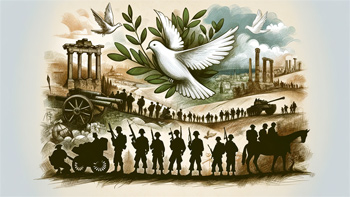Throughout history, wars and conflicts have played a pivotal role in shaping nations and their cultures. They offer insights into our past and help commemorate those who have sacrificed for their countries. Major historical conflicts, including the American Revolutionary War, World Wars I and II, the Latin American Wars of Independence, and the Vietnam War, are highlighted for their contributions to the establishment of important holidays and remembrance days around the world.
American Revolutionary War (1775-1783)
The American Revolutionary War, a seminal event in world history, marked the birth of the United States as an independent nation. This war culminated in the Declaration of Independence on July 4, 1776, a date now celebrated as Independence Day in the United States. This day is a federal holiday, commemorated with fireworks, parades, and a deep sense of national pride, reflecting the American spirit of freedom and democracy. The war's impact extends beyond the U.S., serving as an inspiration for other nations striving for self-governance.
World War I
World War I, often referred to as the Great War, was a global conflict that left an indelible mark on the 20th century. Its conclusion on November 11, 1918, is remembered in various forms across the globe. In the United States, Veterans Day honors not only those who served in World War I but all veterans who have served the nation. The United Kingdom, Canada, and other Commonwealth nations observe Remembrance Day to honor those who died in World War I and subsequent conflicts. Similarly, many countries celebrate Armistice Day to commemorate the end of this devastating war. These observances often include moments of silence, memorial services, and the laying of poppies, symbolizing the bloodshed on the battlefields.
World War II
World War II, the most extensive and deadliest conflict in human history, reshaped the global order. Victory Day in Russia celebrates the Soviet Union's triumph over Nazi Germany, marking the end of the European phase of the war. Anzac Day, observed in Australia and New Zealand, initially commemorated the ANZAC's landing at Gallipoli during World War I. However, it has since evolved to honor all military personnel who served in various conflicts, including World War II. These commemorations often involve dawn services, marches, and a reflection on the courage and sacrifices of the soldiers.
Latin American Wars of Independence
The Latin American Wars of Independence, led by figures like Simón Bolívar, liberated much of South America from Spanish rule. These wars are a testament to the desire for self-determination and freedom. Simón Bolívar's Birthday is celebrated in various Latin American countries, honoring the legacy of a man whose vision and leadership were instrumental in the continent's struggle for independence. This day is marked by parades, speeches, and cultural events, celebrating not only Bolívar's life but also the broader ideals of liberty and national sovereignty.
Vietnam War
The Vietnam War, a prolonged conflict that deeply affected both Vietnam and the United States, is remembered through various national holidays. In the U.S., Veterans Day is a poignant reminder of the sacrifices made by soldiers in Vietnam, among other conflicts. Vietnam celebrates Reunification Day, marking the end of the war and the reunification of North and South Vietnam. This day is observed with ceremonies, parades, and public events, symbolizing national unity and healing after years of conflict.
Bangladesh Liberation War
The 1971 Bangladesh Liberation War, a significant event in South Asian history, led to the creation of Bangladesh as an independent nation. [Victory Day in Bangladesh] commemorates this momentous victory over Pakistan. Marked by national pride, this day involves parades, cultural performances, and remembrances of the sacrifices made for independence. It is a day that not only celebrates freedom but also reinforces the identity and unity of the Bangladeshi people.
Other Global Conflicts and Their Commemorative Holidays
Apart from the major conflicts discussed, there are numerous other wars and conflicts throughout history that have given rise to significant holidays and observances. For instance, Memorial Day in the United States, originally known as Decoration Day, commemorates all U.S. military personnel who have died in military conflicts, dating back to the Civil War. In Europe, D-Day commemorations remember the Allied forces' landing in Normandy, a pivotal moment in World War II. Israel's Yom HaZikaron, or Memorial Day, solemnly honors fallen soldiers and victims of terrorism, reflecting on the sacrifices made for the nation's existence and security. In France, Bastille Day celebrates the French Revolution, a conflict that drastically altered the country's political landscape. These holidays, like those linked to the wars previously mentioned, play a crucial role in national identity, serving as moments for reflection, gratitude, and sometimes, a renewed commitment to peace and understanding among nations.
In essence, these holidays and observances born out of wars and conflicts serve as powerful reminders of our shared history. They remind us of the costs of war, the value of peace, and the enduring spirit of resilience and bravery. As we reflect on these significant events, we honor the memory of those who fought and sacrificed for the ideals and freedoms we cherish today. Understanding these historical contexts enriches our perspective on global cultures and underscores the importance of remembering our past to build a more peaceful future.
